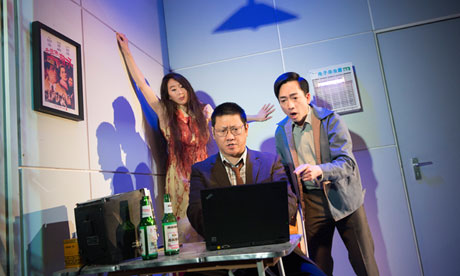Theatre tickets: when did they become so expensive?
Premium tickets over £100. A £1,500 access-all-Ayckbourn luxury package. £10,000 for lunch with the director of the National. Welcome to the curious world of the 'premium' theatre ticket

Have the cast round for tea for £50,000 … Almeida hit Chimerica. Photograph: Tristram Kenton for the Guardian
While the high price of theatre tickets is well known, it still comes as a surprise to discover that some members of the audience for Arrivals & Departures, the latest play by Alan Ayckbourn, may have paid £1,500 for the privilege. This is the price of the ultimate luxury package on offer from the Stephen Joseph theatre in Scarborough; there are others on offer for £750. The £1,500 ticket involves access to rehearsals, backstage tours, Q and A sessions with Ayckbourn, as well as a seat at the finished play, about a blundering army unit trying to catch a terrorist at a railway station.
The theatre says the move was driven by economic necessity. Following cumulative cuts in subsidy of 18% in recent years, it makes sense to seek a greater contribution to the box office from those who might be able to pay it. The Production Syndicate, as this scheme is called, has so far raised more than £30,000. Even so, the result is that, at some performances, the amounts paid by different members of the audience will vary from £13 (the cheapest concession) to £1,500. This is even more than the difference between economy and first class on an aeroplane.
The Ayckbourn package is the most extreme example so far of the increasing gap between the front stalls and the rear walls – the boxes and the gods – in most theatres these days, as subsidised houses face cuts and commercial producers fight for audiences during a recession. In London, for example, the National, the Almeida and the Donmar offer various enticements to the richer members of the audience, some of which make the grand-and-a-half Ayckbourn package look like a bargain. At the National, shelling out between £2,500 and £4,999 brings, among other things, invitations to "intimate Cottesloe Club nights", while those on the next rung (up to £9,999) get invited to a lunch hosted by Nicholas Hytner, the National's artistic director. At the Almeida, under its Visionaries scheme, punters who put up £50,000 qualify for an event in their own home: a dinner or a cocktail party, celebrating the cast and the creative team of a chosen production.
This means that, in some Almeida audiences, the gap between the cheapest and most expensive tickets may range from £8 (restricted view) to £50,000 – a gap that, in airline terms, is more like the difference between Easyjet and private jet. And yet, unlike in aviation, the purchasers of these two pricing options may be queuing for the same bar and loo.
The problem is that theatre is an unusual economy. It is rare to find a car salesroom with a clientele that stretches from Lamborghini-buyers to people seeking an MOT-cheating old banger. But a playhouse with a hit show will find both sorts of customers clamouring on the forecourt: the increasingly severe divide in pricing is an attempt to make sense of the unusual situation of having demand for the same product from those for whom price is no object, and those to whom it is the first concern.
To the credit of producers and artistic directors, the spread of premium tickets has, in many cases, been offset by a greater availability of cheaper or on-the-day seats, with the result that a sort of progressive taxation system has been created, with theatre-goers encouraged to pay in accordance with their means. The audience for Daniel Radcliffe in The Cripple of Inishmaan, showing at London's Noel Coward theatre, will include some who have bought premium stall tickets for £87.50, but also as many as 200 others who have purchased the £10 seats that are made available each day.
Producers will also point out, in defence of the high-end figures, that their move to premium pricing was motivated in part by the heavily inflated resale of tickets for hit productions by touts and sell-on sites. For example, although The Book of Mormon invites the poshest shoppers to pay £127, the secondary market was asking far more than that from people aiming to get in to the sold-out performances.
As in many economic situations, however, there is a squeezed middle: theatre-lovers who are neither rich enough to buy a premium ticket or a meet-the-cast deal and who don't have a life/work schedule flexible enough to queue in person or online to get the discounted vouchers. Outside those extremes, the finances of an evening at the theatre in decent seats remain dizzying.
This was brought home to me again by a recent outing to Derren Brown: Infamous, a night of mind-reading and memory games. One of my children, a fan of the illusionist's Channel 4 show, was desperate to see the production and was only able to go at short notice. Brown is booked into one of London's biggest auditoria – the 1,400-seat Palace theatre – but because he is a one-off genius and has also frequently been on TV, the only seats available for the Thursday night performance we needed were either restricted view or a pair at the very back of the dress circle. I would not have been prepared to pay £96 for the premium stalls seats, but it is a testimony to Brown's commercial power that I wouldn't have had the chance – because all had been sold.
Having paid £102 for the rear dress seats and been offered a programme at £8 (even though the cast-list for a one-man show must be rather short), we discovered that the upper tiers of the Palace, build for short Victorians, have a curve that makes it impossible for a man of 6ft 3in and a child not much shorter to sit in them other than twisted sideways with their legs entwined. Startled at having paid more than £100 to watch a show in profile while potentially developing deep-vein thrombosis, I mentioned this to an usher, who kindly found us a couple of vacant aisle seats elsewhere that offered a worse view but more chance of survival.
Having the luck to receive complimentary press tickets on most occasions, I am always in awe of the outlay that so many people are willing to make to see theatre. In the case of Brown – who is the sort of extraordinary and inexplicable performer about whom we will bore our grandchildren silly – I was happy to have paid what I did and might even consider a premium package next time, although it is in the nature of Brown's act that he can't really invite the rich into his rehearsals, or conduct Q and As on how his tricks work. Theatre critics, though, should never forget that the heroes of the medium are theatre-goers.

No comments:
Post a Comment